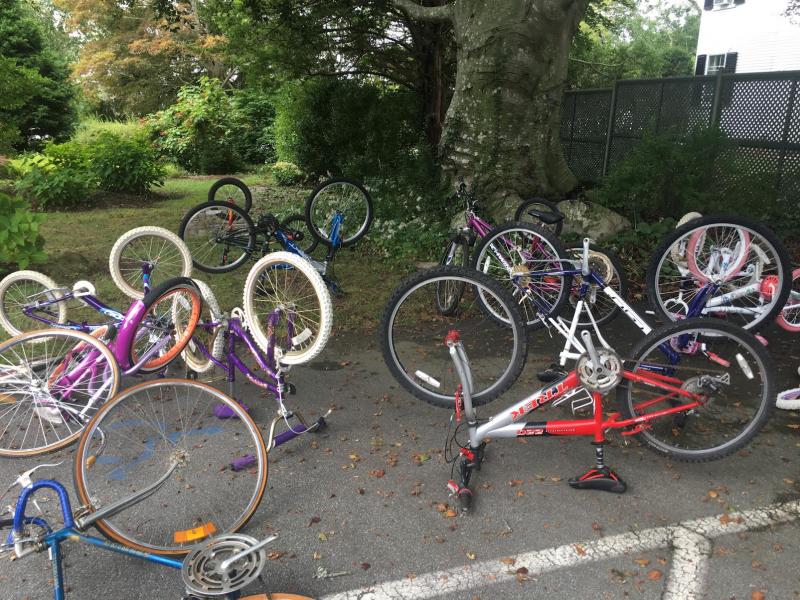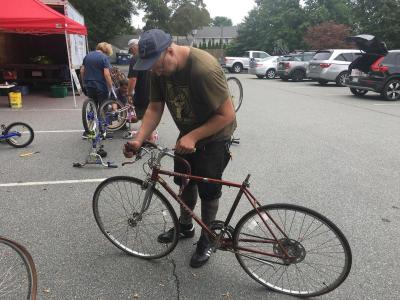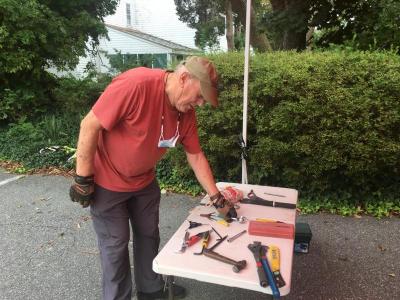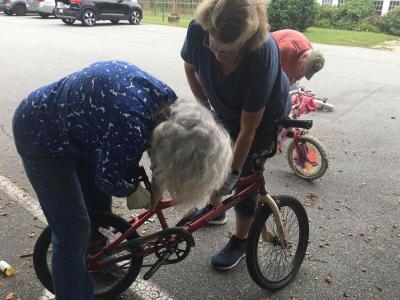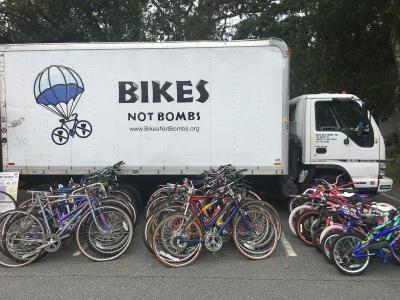Bike collection helps get wheels turning toward better lives
Dozens of used bicycles, in a variety of sizes and conditions, filled the South Dartmouth Congregational Church parking lot Saturday.
They would soon find new, potentially life-changing uses.
The church’s outreach committee hosted the collection in conjunction with Bikes Not Bombs, a Jamaica Plain nonprofit that uses donated bicycles as a vehicle for social change and economic mobility.
More than 80 bicycles had been collected, both in person and through a pick-up service, as of noon.
“People are so glad to have a purposeful way to get rid of their bikes,’’ said Alice Root, a member of the outreach committee.
Some of the bicycles collected will be sent to communities in Africa, Latin America and the Caribbean, said Marty Andrius, who works with Bikes not Bombs at its Jamaica Plain headquarters.
People in those nations can use the bikes for transportation and are also taught to repair bicycles, which provides them with a valuable trade, he said. They particularly work to ensure that women learn bicycle mechanics, he said, so they can be empowered.
“If you have a skill, you become a lot more valued,’’ he said.
Others will be sent to the organization's Earn-A-Bike and Girls in Action programs, where teenagers learn bicycle safety and mechanic skills in the process of earning bikes to keep for themselves.
Still others go to the organization’s Jamaica Plain bike shop, which sells the refurbished bicycles and bicycle parts to help support the group’s activities. These shops employ many graduates of the programs.
The organization collects about 5,000 used bicycles and tons of used parts from supporters throughout New England each year.
For South Dartmouth Congregational Church members, the collection fits their goal of reaching out to support people on the local, national and international levels, Root said.
The event had an added benefit, she said. Because the collection was held outdoors, social distancing was more easily attainable.
Church volunteers did more than gather the bicycles. Andrews and senior apprentice Joseph Pires of Dorchester helped them perform basic work on the bikes before they were sent to the organization headquarters.
This taught them new skills, Root said, but also reminded them what they were already able to achieve, she said. For example, she said with a laugh, she knew how to use an Allen wrench through her work in industrial arts, a tool she used Saturday on the donated bikes.
Heidi Harring of Dartmouth donated her late father’s bike and another bicycle that her children outgrew. She supports the group and has passed on her bikes to them before, she said. “I was aware of them and the purpose they serve,’’ she said.
Repurposing the bikes also keeps them out of landfills, church outreach committee member Derrick Jones said. “There’s a big need for these bikes,’’ he said, especially in places where people would otherwise have to walk great distances to obtain basic necessities.
Recycling is another valuable aspect of their work, Andrews said, and the group recycles as much of the bike as possible if parts are no longer viable.
Kristy Oliver donated her old bikes when she decided to get new ones. “We wanted to give someone a chance who maybe doesn’t have a bike,’’ she said.
Andrius also hopes people learn more about the value of bicycling, he said. Riding, he said, improves health, leads to less traffic congestion and serves as a cheaper transportation alternative.
“It allows people to be more independent’’ and less reliant on more expensive modes of transportation, he said.
That sense of independence is crucial, Pires said.
“I believe that most of the change that comes to disenfranchised people comes from the community and not the government,’’ he said. “This proves people can come together and change things on their own.’’



